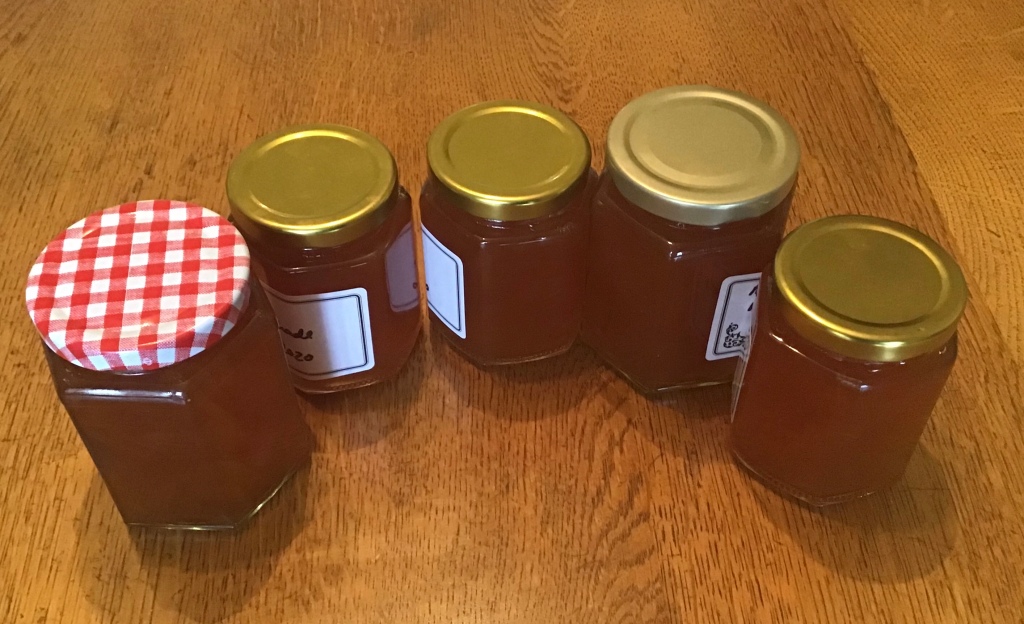It started with Paddington 2. That film inspired Debbie to make many jars of delicious marmalade from the carton of Seville oranges she unexpectedly acquired in Waitrose.
Hitherto breakfast at Edwards Towers had been a snatched, casual meal: a bowl of Weetabix before my run, or Shreddies afterwards, cereal in bed as a weekend treat: or when still at work, scone fed into my mouth with eyes on my screens as I logged in, scrutinising my emails for anything remotely interesting, or discussing the day ahead or the weekend past with my colleague.
The making of the marmalade has changed everything. The table is set, orange juice is poured, porridge and toast are prepared, and the cafetière is reached down into service. Breakfast is becoming ever more formal. Come back in a couple of months and you’ll find me sporting whiskers and a white napkin while a rosy-cheeked maid serves me my kippers, eggs and tomatoes under a silver cloche, as my butler hands me a freshly ironed copy of The Times, from which I emerge occasionally to offer comments like “Trouble brewing in the Baltics, m’dear.”
This new routine is very pleasant, of course, but it represents change, and change can be difficult for me. Just ask the lovely fellow who worked at Moorgate Buttery. So set were my habits that I acquired the nickname “Brown Scone and Orange Juice” – he would spot me in the distance picking my way round the Crossrail works, and have my breakfast lined up on the counter as I walked in. I sometimes wonder whether retirement might have been a mistake, if the price of leisure is forgoing that sort of service.

When the plucky Buttery was eventually consumed by the building site I had to devise a new breakfast regime, just as I was reaching the age where I felt that nothing should, ever, change again. It was a difficult few months. I must have been unbearable, and if you’re reading this Chris, I’m sorry.
Breakfast is a variable feast, at its best when you take a break in a hotel or B&B in Britain. Being no chef, I approach this from the perspective of the gourmet, or, at least, the glutton. On the first morning, I can never resist the full English/Scottish/Welsh/Irish/Cornish etc. Usually you will be elsewhere for lunch and often will choose to dine in a different restaurant, so breakfast is critical to your assessment of the hospitality. Large hotels too often leave you to forage in the buffet for dried up slivers of bacon, congealed scrambled eggs and greasy lukewarm frankfurters. Posh hotels will sometimes plate up a breakfast for you which in theory has all the ingredients, but where they are not, as it were, talking to each other: egg, sausage, bacon, tomato and mushrooms isolated like strangers at an awkward party.
But the real treats are to be found at smaller inns and B&Bs, where a hearty plateful is the norm, with the constituents in joyful harmony. My list of core ingredients would include sausage, bacon, fried egg, fried tomato and mushrooms, while welcome additions would be baked beans, fried bread, and black pudding. Hash browns are a transatlantic addition, but can be allowed. Tinned plum tomatoes are not: they are a cooking ingredient only. Not everyone likes baked beans in the mix, and they will often be served in a pot: “Free the beans” is the cry as I tip them out to join the team on the plate.

Essential accompaniments include fresh orange juice (not that pasteurised muck), toast and marmalade (a full English – although very filling – contains few carbohydrates, so you must pay attention to fuelling yourself properly) and coffee refilled to order.
The most delicious and awe-inspiring cooked breakfast I have eaten was at Redgate Smithy B&B formerly run by my friend and schoolmate Clive. The full Cornish was a wonder to behold, and can still sometimes be viewed on satellite images. I had to call on my marathon endurance skills to finish it, but did I give up? No sir, I did not. It certainly repaid the effort.
Of course, some private houses serve an excellent cooked breakfast: my brother Rob’s famous Cholesterol Bath, often served as a farewell meal, springs to mind. If we care about our health, this should not become a regular habit. But I’ll leave you with the thought that Field Marshal Montgomery was said to have polished off a full English every morning during his North Africa campaign – a possible origin of the phrase “the full monty” – and he lived to be eighty-eight.

Leave a comment